Roomba vs Shark – which robot vacuum is right for your home?
From 1,000+ hours of testing, we pit Roomba vs Shark to see which robot vacuum cleaner brand comes out on top

Alex David
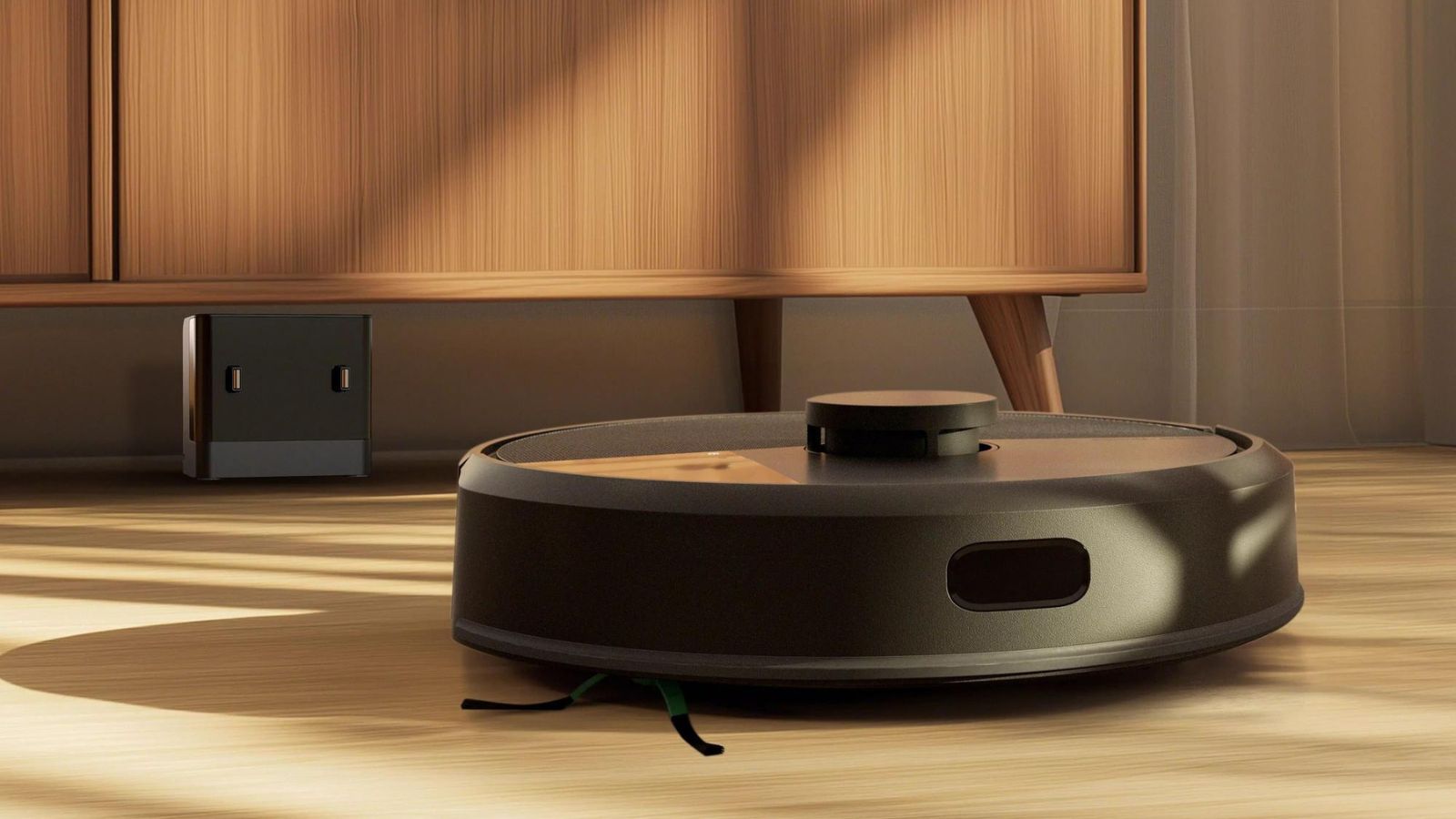
iRobot Roomba may not have invented the robot vacuum, but they popularized it and brought the concept into the mainstream back in 2002. Since then, Roombas have pushed the market forward, paving the way for alternative brands such as Shark to develop their own vacuums.
I'm Homes & Gardens' home tech editor and my team of product testers has spent 1,000+ hours testing vacuum cleaners, including 19 of the best robot vacuums. We've tested the latest and greatest from both Roomba and Shark and we know their offerings inside and out.
Essentially, Shark offers better value but Roombas perform better. If money's no object, opt for a Roomba, but if your budget is tighter, opt for a Shark. We go into all the details you need to know below.
Roomba vs Shark: Which is best?
Bottom line: Roomba robot vacuums perform better, Shark robot vacuums offer better value.
Some of the highest performing robot vacuums we've tested are from iRobot Roomba. The top models are able to deep clean your floors even if you have pets or lots of carpets, and their mopping abilities are fantastic.
But to achieve that level of cleaning you're looking at parting with $1,000+, as the more basic, budget-friendly Roombas aren't as effective as the competition.
Instead, the Shark robots among the best Shark vacuums are sold for hundreds of dollars less. They still vacuum, mop and self-clean impressively well, just not to the same standard as the top Roombas.
If you're looking for the absolute best, go for an expensive Roomba. If you can accept a less premium device, then save some money and go for a Shark.
Roomba vs Shark: The top two
Out of both brands' offerings, the iRobot Roomba Combo j9+ performed the best on test. It combines efficient vacuuming with mopping in a way that's fully hands-free, unlike many other robots that require you to manually switch between the two functions. It's a quick and quiet cleaner and even has a dirt detective function to let you know which parts of the house accumulate the most dirt.
But the Shark PowerDetect 2-in-1 isn't far behind. It's a great all-rounder that can do a decent job vacuuming, mopping and building maps of your home, boasting Shark's latest dirt detection technology to target hidden dirt and dried stains, optimizing cleaning as it goes. It just isn't quite as powerful as the Roomba Combo j9+.
We've tested the latest Roomba, the iRobot Roomba Combo 10 MAX, and were disappointed by its weak performance considering it's the most advanced (and most expensive) robot ever released by iRobot. For this reason, the Combo j9+ remains our favorite.
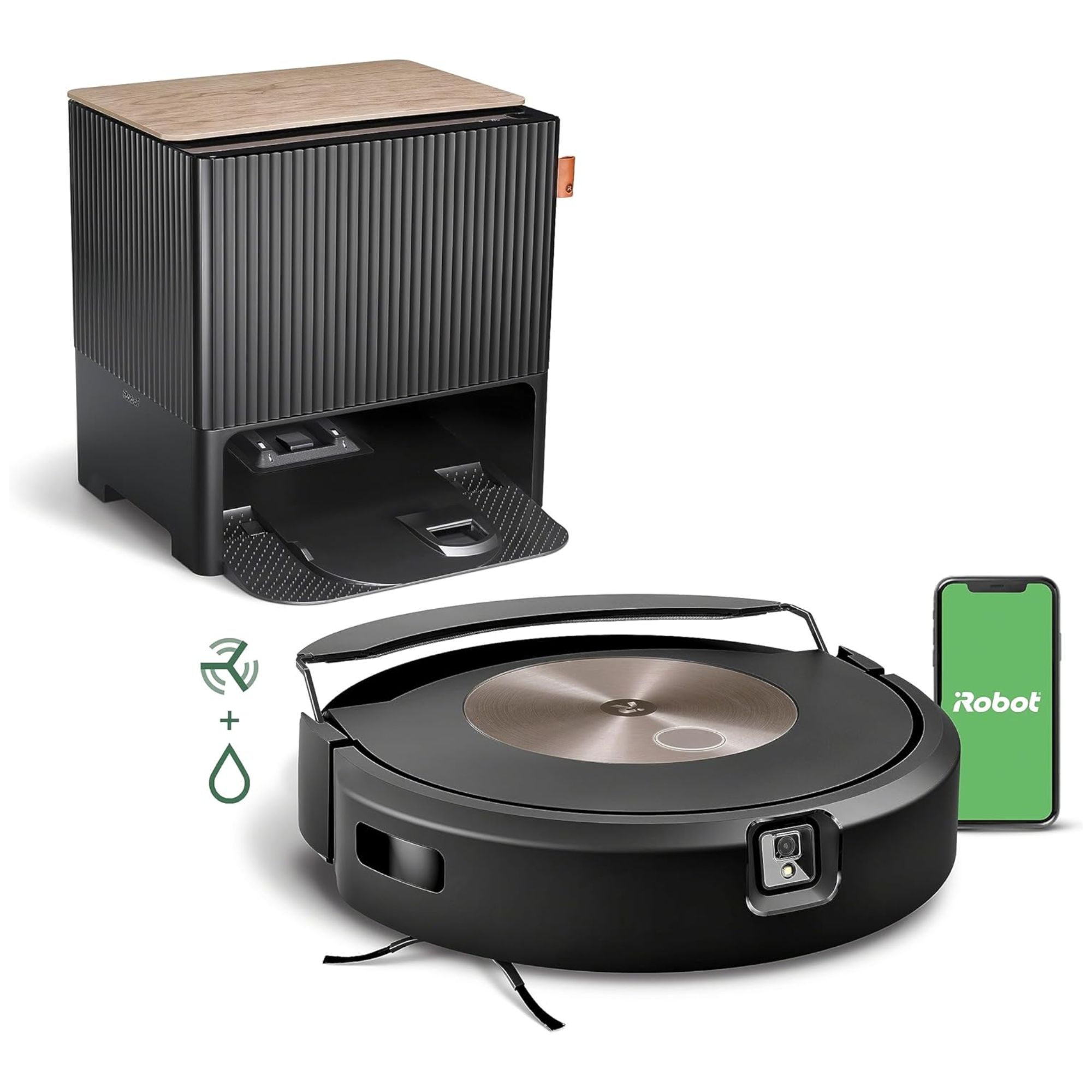
Read our full iRobot Roomba Combo j9+ review.
Pros
- Good suction
- Great on fine dirt on hard floors
- Good on hair
- Easy automation
- Simple app
- Relatively quiet when vacuuming
- Great mop
Cons
- Incredibly loud self-emptying
- Not a perfect clean
- Shape means it struggles to clean circular objects
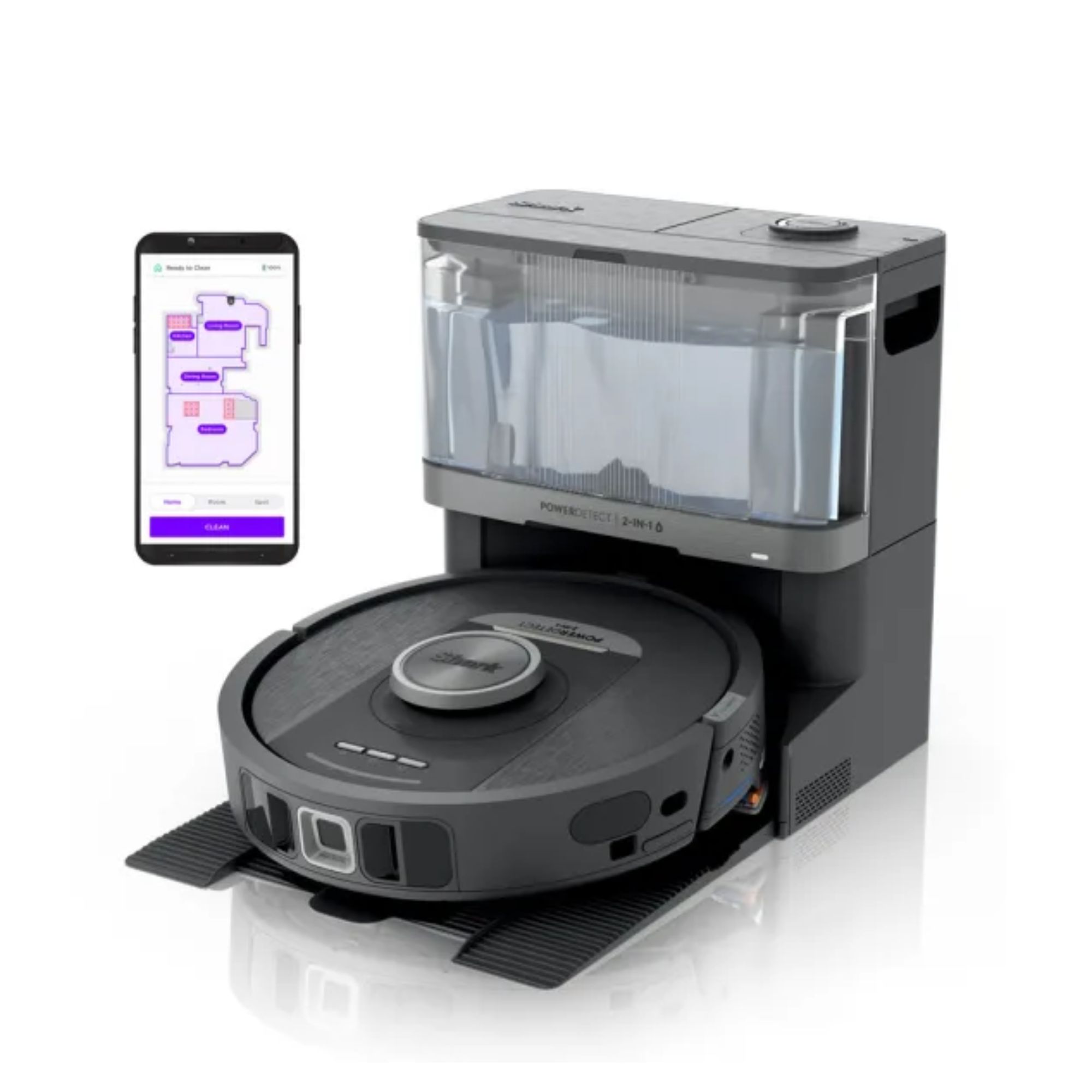
Read our full Shark PowerDetect 2-in-1 review.
Pros
- Low-maintenance design
- Impressive mopping abilities
- Great navigation and obstacle avoidance
- Washes and dries its own mopping pad
- Climbs over tall thresholds
- Reasonably priced
Cons
- Fairly noisy during operation
- Disappointing edge cleaning
- Doesn’t handle long hair well
Roomba vs Shark: Which has better suction?
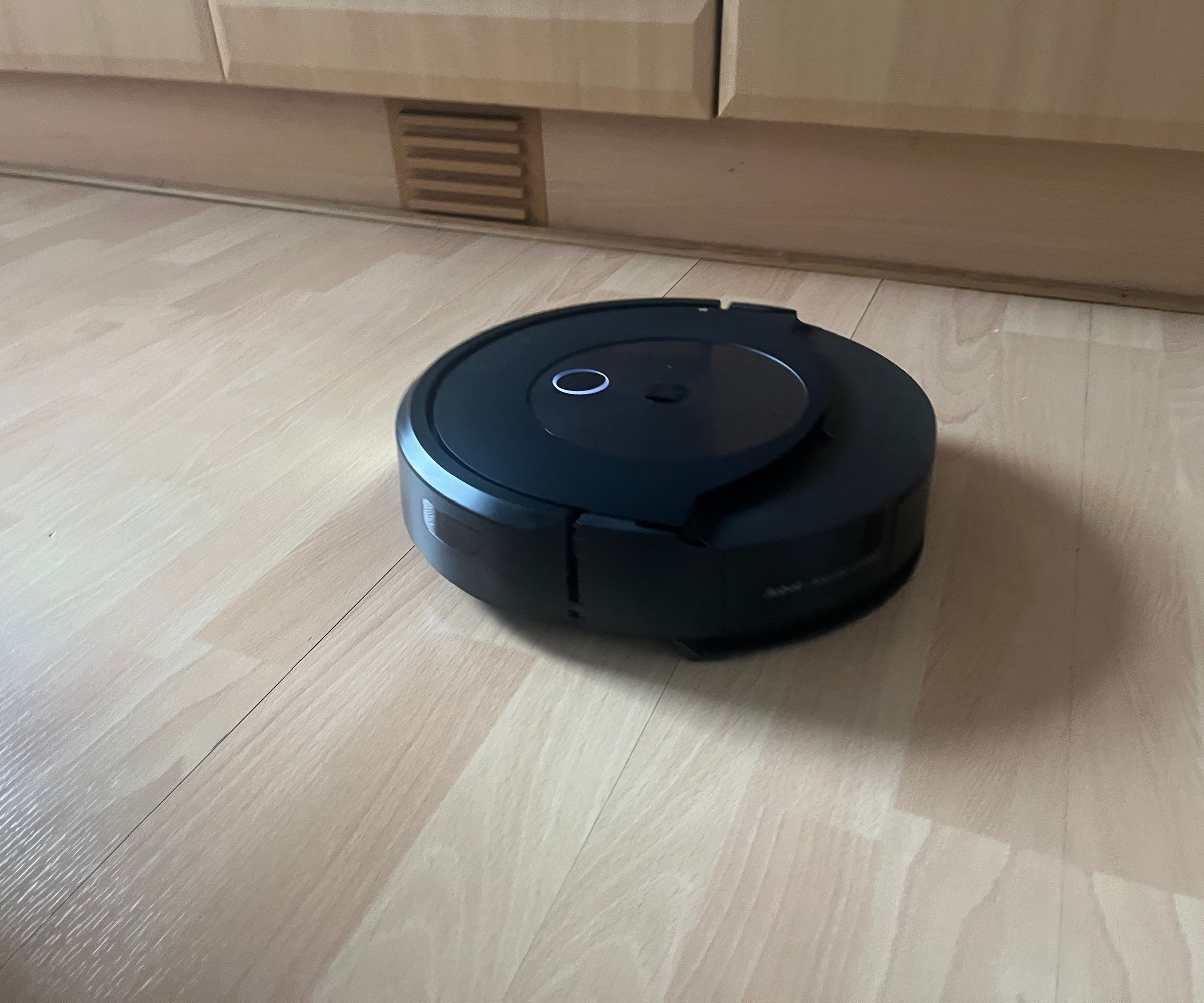
The top iRobot Roomba robot vacuums boast higher suction than Shark's best.
WINNER: iRobot Roomba j9+
The Roomba Combo j9+ has exceptionally good suction and easily tackles all sorts of debris. And unlike other robots, no dirt got stuck to the wheels, avoiding dragging it round the house. We never expect a robot to be the best vacuum for carpet, but the Combo j9+ can actually vacuum dust from thick rugs and medium-pile carpets.
While the suction on the Shark PowerDetect 2-in-1 is impressive, it missed around 20% of the coffee grounds we threw on the floor. Our process for how we test vacuums involves using substances with different consistencies, and the Shark struggled to completely clean what is similar to mud and dirt on your floors.
Plus, the Shark PowerDetect 2-in-1, which boasts the most advanced cleaning technology of any Shark vacuum, disappointed us with its edge-cleaning abilities, which is a key feature advertised for this model.
Roomba vs Shark: Which is best for pet hair?
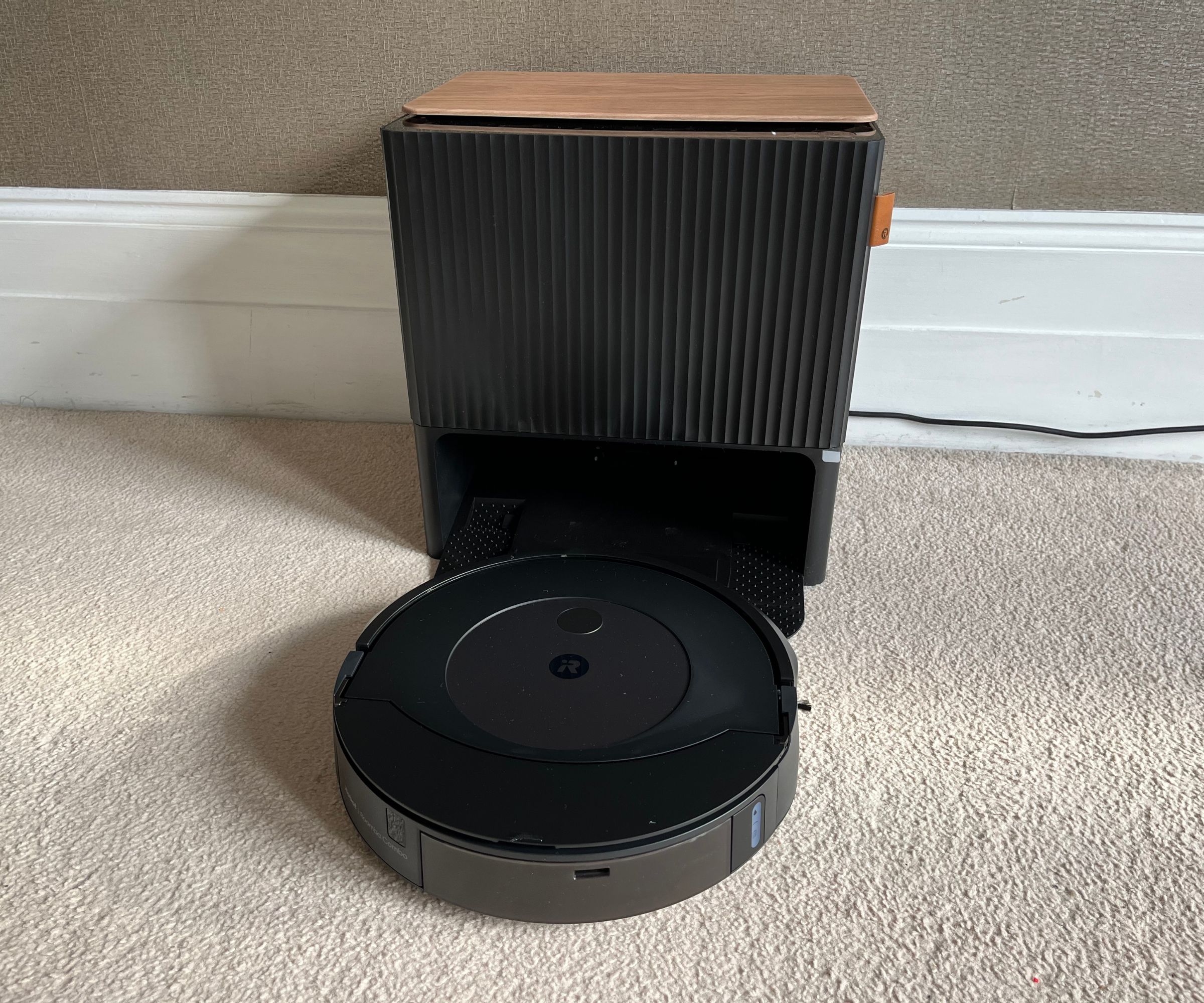
Not only do Roombas vacuum pet hair more effectively, they also rarely get tangled with hair.
WINNER: iRobot Roomba
Roomba wins if you want a robot vacuum that's good with pets, and their lineup makes up some of the best robot vacuums for pet hair that we've tested. When testing the iRobot Roomba Combo j9+, Alex David noted, 'It always pulls hair out of the carpet.'
A common robot vacuum mistake consumers often make is assuming that these tiny robotic helpers can vacuum stubborn hair from carpet, because usually, they can't. Fur traps itself to carpet fibers, which is why pet hair is so hard to vacuum. That's what makes the Combo j9+ so impressive.
iRobot also have a policy to protect pet owners: P.O.O.P. – a Pet Owner Official Promise that the robot won't run through any pet messes. If it does, they'll replace the machine for free. That's a fantastic guarantee, because the danger with a robot vacuum is that it will run through pet droppings, creating a gross mess and causing a common fault engineers fix in robot vacuums.
The P.O.O.P. is only valid for the j9+ and j7+ models, including the iRobot Roomba j7+, which we've also tested and loved.
Until we tested the five-star eufy Omni S1 Pro, the Combo j9+ had perhaps the best anti-hair wrap we've seen in a robot vacuum. This is thanks to two bumpy silicone rollers that always pull hair out of the carpet while never getting stuck, rivaling some of the best vacuums for pet hair.
Contrastingly, the Shark robots that we've tested can't always handle large amounts of hair. And their best model the PowerDetect 2-in-1 wrapped with hair incredibly easy on test, resulting in tester Camryn Rabideau writing, 'This was a major downside for me, as I’d likely need to clean off the brushroll at least once a week to keep the vacuum working properly.'
Roomba vs Shark: Which has the best app?
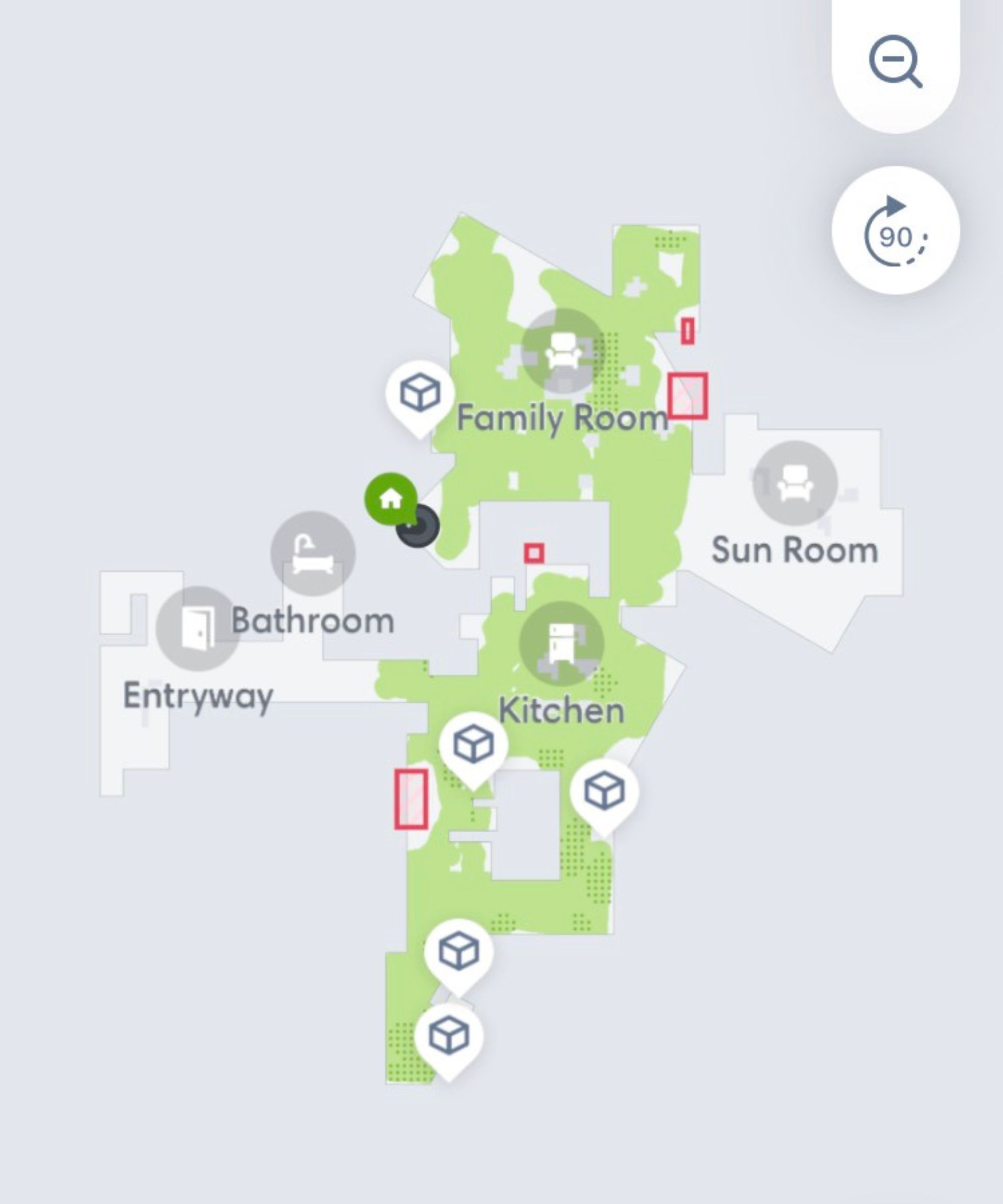
You can map your home, set zones and see cleaning progress using the iRobot app, but our testers have found the Shark app to be a little confusing at times.
WINNER: iRobot Roomba
For the most part, the iRobot and Shark apps are similar. Both brands' robot vacuums offer similar features: zone mapping, scheduled cleaning and automatic updates. But when it comes down to how easy they are to use, iRobot wins.
A good app interface is crucial with any smart home must-haves, but particularly robot vacuum cleaner as there are often no buttons on the robot itself. If the app is poor, the robot can be hard to control. One day, robot vacuums may be advanced enough to bring us coffee, but for now we still need to control them ourselves.
The best user experience came from the iRobot app. It's intuitive with a clear mapping system and a universally user-friendly interface. It took around 50 minutes (and two runs of the house) for the j7+ robot to develop an accurate map of a home.
Once they know your home well, Roomba robots will give special attention to areas of the home that tend to get dirtier. It also becomes more efficient over time, moving in a more patterned way rather than moving erratically – as it did at the beginning. It's also great at avoiding any keep-out zones you set.
By comparison, the Shark app is a little confusing to use, and occasionally limiting. Our tester Camryn found that she needed 'several tries to figure out how to select just one room for cleaning'.
The functions can also be unclear as they have similar names – it's hard to differentiate between 'Zone Cleaning' and 'Room Cleaning', or 'Max suction' and 'Ultra mode'. Overall, Camryn though that Shark's app needed 'a little more finessing' to ensure that it's 'more streamlined' and 'easier to navigate'.
As robot vacuums are the main smart home cleaning tools we have at the moment, their apps will undoubtedly improve from ongoing trial and error.
Roomba vs Shark: Which is quietest?
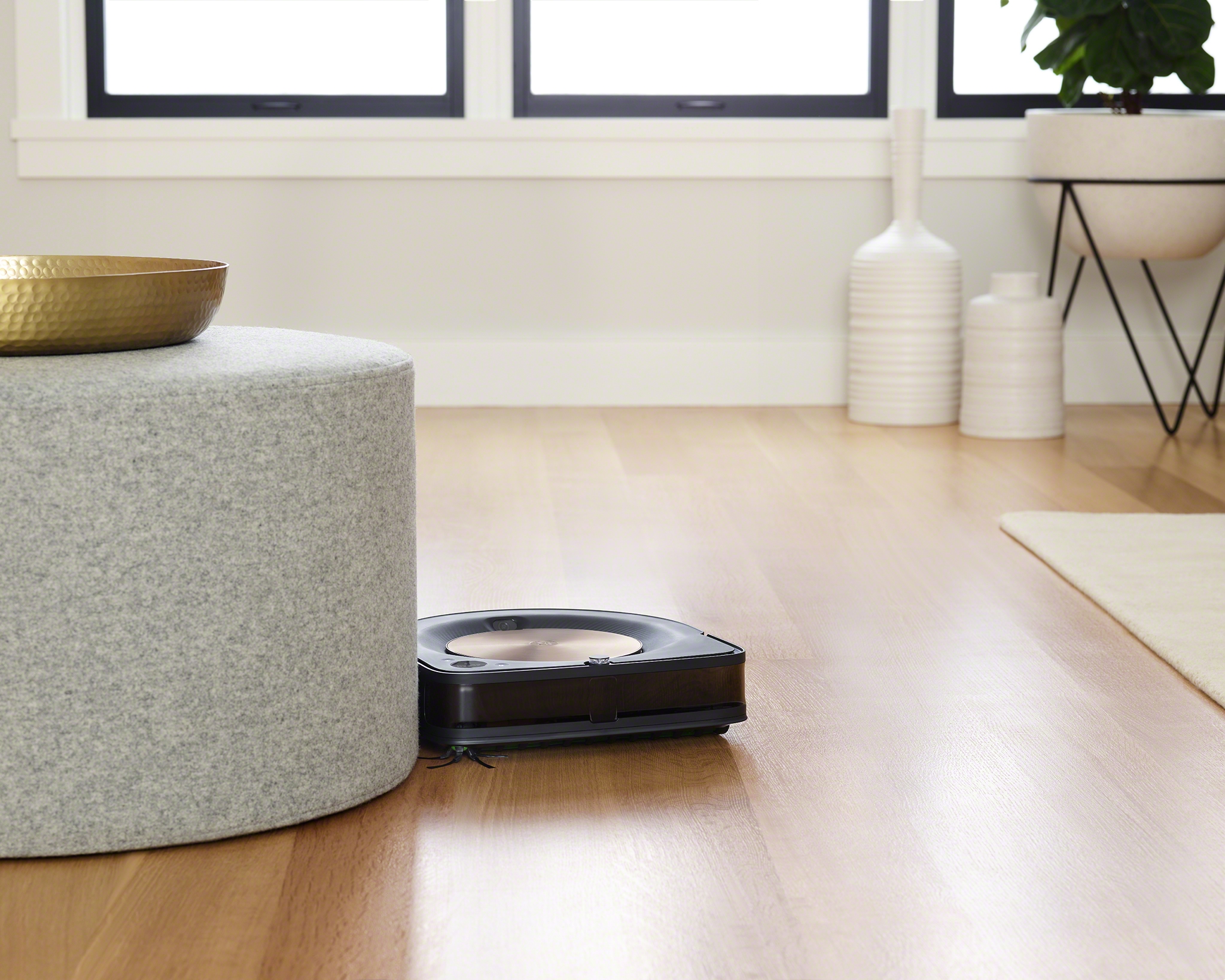
An iRobot Roomba self emptying into its cleaning station sounds similar to a jet engine.
WINNER: Shark
Vacuum manufacturers are loathe to release their recorded decibel levels. That's because dB (decibel) recording are relative, and the same noise level can sound very different in one room with soft furnishings and another with more echoey acoustics. So while we can't report on exact dB readings – and it wouldn't be particularly helpful if we did – we can say how they sounded in person.
We had big issues with the noise level of Roomba robot vacuums. The biggest culprit is the Combo j9+, which is loud as it operates but nothing compared to the noise of its bin. When the self-emptying bin fills, it makes an incredibly loud noise.
It's so loud that our tester Alex described it as like 'a jet plane taking off'. You can't hear yourself talk over the noise of it, and it lasts for several seconds. If you work from home, it's not a noise you want to interrupt your meetings, and it might disturb you on the weekends. With that said, Shark vacuums aren't exactly subtle, but they're not as bad as Roomba.
Roomba vs Shark: Which has better value?
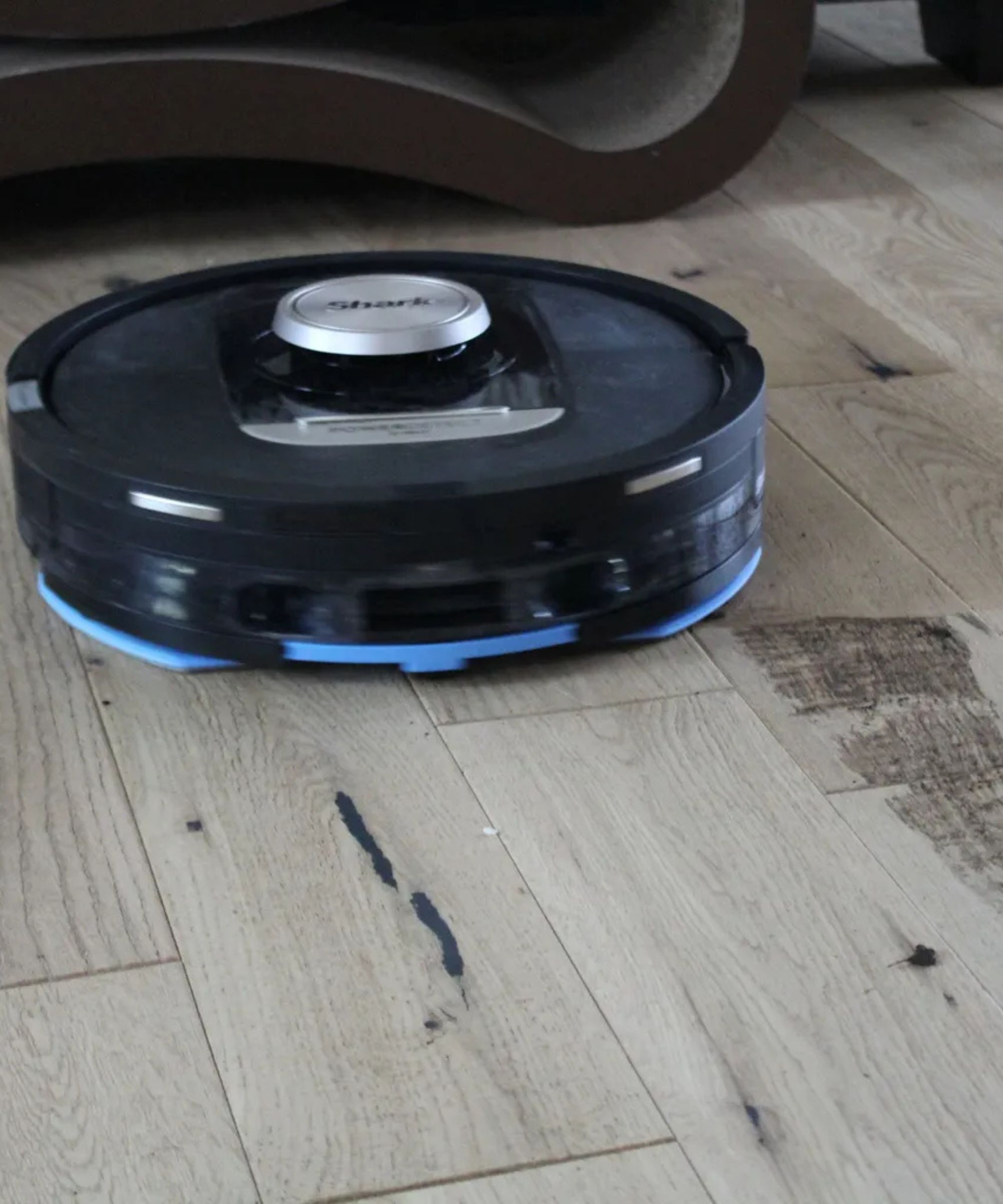
Shark's best robots cost $100s less than the best Roombas.
WINNER: Shark
iRobot Roomba have dominated the robot vacuum market for some time now, and while this means their lineup is exceptional, it's reflected in the price.
The stand-out iRobot features I've discussed throughout this page can mostly be found in the expensive models that cost upwards of $1,000. Unless you're finding one of the best vacuum deals, that's a lot of money to part with.
Of course, with iRobot you're paying for excellence, but if you don't mind a similar-but-not-quite-as-good alternative, you can save $100s on Shark's bests. You may have to cut hair out, spend more time figuring out the app, or clean up after it a bit more, but these are small sacrifices.
Having two vacuums is better than one, so pair your new robot with one of the best cordless vacuums to cover your whole home.
Do you need a robot vacuum? How they stack up against an actual vacuum
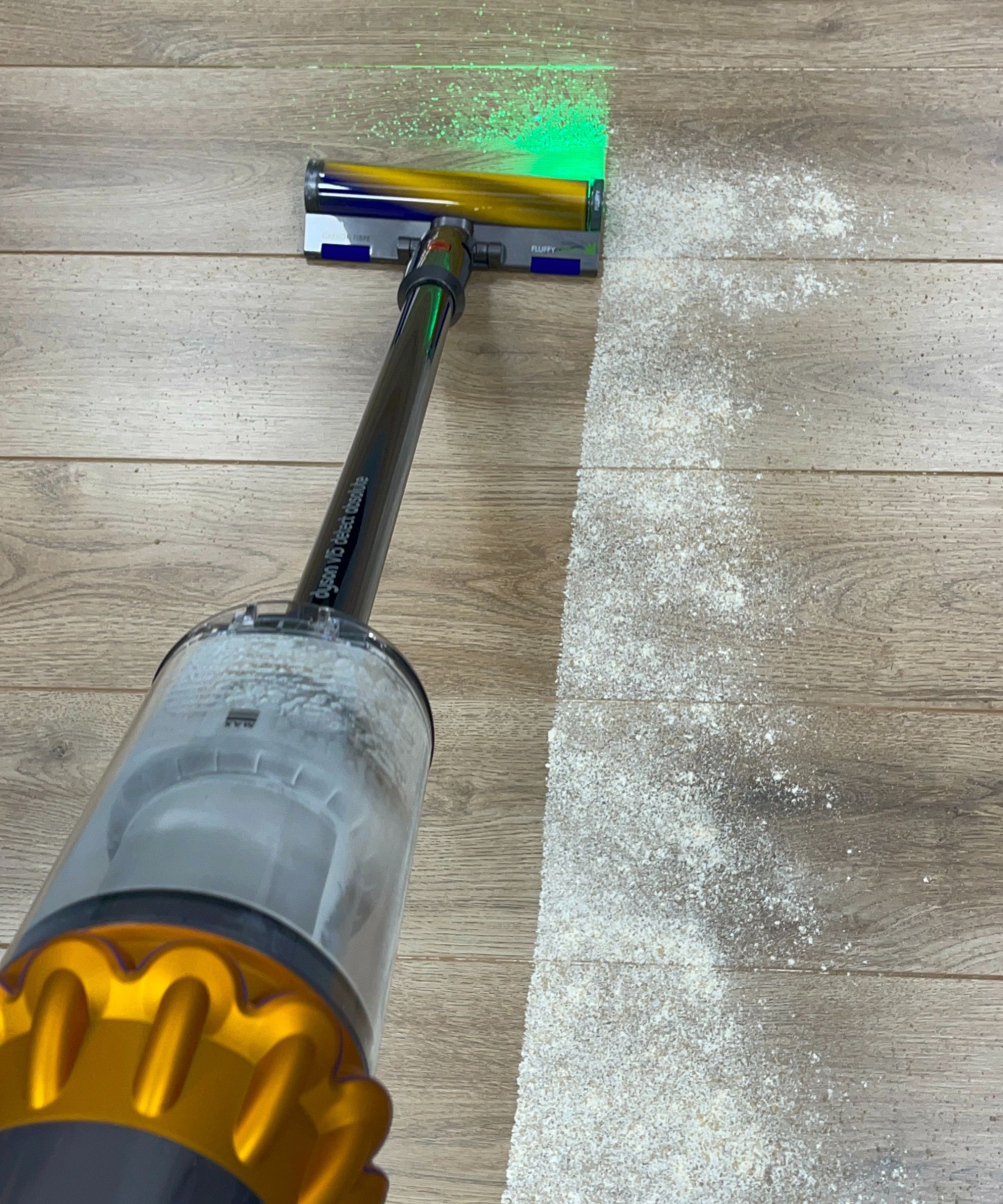
Robot vacuums can't beat the cleaning power of a full-sized vacuum, but they offer great day-to-day maintenance and light cleaning to cut down how much time we have to vacuum ourselves.
Robot vacuums are brilliant for specific users, so whether you need one ultimately depends on your habits. If you're tight on time and often too busy to tidy, you'll find the schedules and independent cleaning capabilities of vacuums really useful. They'll save you time and stress, without compromising on cleanliness. If you struggle with mobility, they can save you a lot of pain and frustration too.
However, there are plenty of people who enjoy cleaning at a specific time with a cordless or upright vacuum. These models are also much more useful if you have a specific area that you need to clean, so if you've had a spill, a handheld vacuum will give more direct results. That being said, some robot vacuums do have mess detection, like the Eufy S1 Pro Omni – our all-time best-on-test robot vacuum.
Next, learn about the things you should consider when choosing a robot vacuum, or browse the best vacuums for pet hair and the best Dyson vacuums to upgrade your home cleaning.
Design expertise in your inbox – from inspiring decorating ideas and beautiful celebrity homes to practical gardening advice and shopping round-ups.

Dan is the Home Tech Editor for Homes & Gardens, covering all things cleaning, sound, smart home, and air treatment across the Solved section.
Having worked for Future PLC since July 2023, Dan was previously the Features Editor for Top Ten Reviews and looked after the wide variety of home and outdoor content across the site, but their writing about homes, gardens, tech and products started back in 2021 on brands like BBC Science Focus, YourHomeStyle and Gardens Illustrated.
They have spent more than 400 hours testing and reviewing vacuums, soundbars and air purifiers for Homes & Gardens.
Dan has a BA in Philosophy and an MA in Magazine Journalism. Outside of work, you'll find them at gigs and art galleries, cycling somewhere scenic, or cooking up something good in the kitchen.
- Alex DavidGardens Contributor